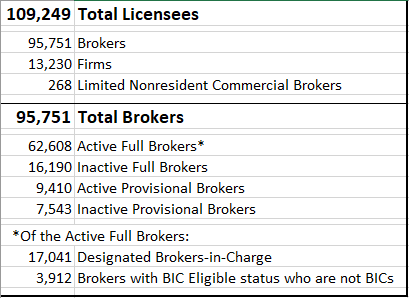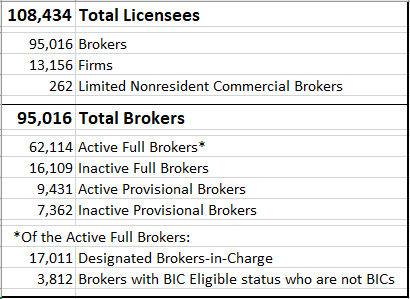Bulletin Search
Disciplinary Actions
ELBERT M. MCLEAN (Sanford) – The Commission accepted the voluntary surrender of the broker license of Mr. Mclean for two years effective November 13, 2019. The Commission dismissed without prejudice allegations that Mr. McClean violated provisions of the Real Estate License Law and Commission rules. Mr. McClean neither admitted nor denied misconduct.
ANDREW Y. VERNON (Charlotte) – By Consent, the Commission revoked the broker license of Mr. Vernon effective December 1, 2019. The Commission found that Mr. Vernon inappropriately utilized a listed property for personal use without the owner’s knowledge or consent and that his conduct was improper and unworthy.
Postlicensing Education Deadline
This article from the November eBulletin is republished here to remind brokers of the new Postlicensing Education requirement effective July 1, 2020.
Beginning July 1, 2020, Rule 58A .1902 will require a provisional broker to complete all three 30-hour Postlicensing courses within 18 months of initial licensure in order to maintain active license status. If you were licensed anytime during 2018, you must complete all your postlicensing courses by July 1, 2020. If you have been licensed in 2019, you will have at least 18 months from your date of licensure to complete the courses.
Example #1: Licensed on February 1, 2018
- 1st Postlicensing course deadline: February 1, 2019
- 2nd Postlicensing course deadline: February 1, 2020
- 3rd Postlicensing course deadline: June 30, 2020
Example #2: Licensed on March 17, 2019
- 1st Postlicensing course deadline: March 17, 2020
- 2nd & 3rd Postlicensing course deadlines: September 17, 2020
Additional information about this important change is provided in the General Update (GENUP) and Broker-in-Charge (BICUP) courses throughout the year. Also, if you are a provisional broker, be on the lookout for email communications from the Commission about the changing education deadlines.
If you have further questions regarding this rule change, please contact the Education and Licensing Division at 919.875.3700.
How to become a real estate instructor in NC
Are you interested in teaching real estate Prelicensing, Postlicensing, or Update courses in North Carolina? If so, you must first be approved as an instructor by the Commission. Commission Rule 58H .0302 dictates the process and requirements for instructor approval.
To qualify for instructor approval, you must:
- hold a North Carolina real estate broker license that is not on provisional status;
- be up-to-date on continuing education;
- have completed 60 semester hours of college-level education at an accredited institution by the U.S. Department of Education; and
- within the last seven years, have EITHER:
- two years of full-time experience in real estate brokerage with one year in NC;
- three years of instructor experience at a secondary or post-secondary level;
- real estate Prelicensing or Postlicensing instructor approval in another jurisdiction; or
- qualifications found to be equivalent by the Commission.
If you meet the qualification criteria, the first step towards approval is completing the New Instructor Seminar (NIS). The NIS is a two day course that is taught by Commission staff. On day 1 of the seminar, you will receive an overview of the Commission’s education programs, an explanation of the Commission’s requirements and expectations of approved instructors, and resources for and examples of effective instruction and classroom management skills. On the second day, you will be required to deliver a 15-minute presentation, as dictated by Commission Rule 58H .0302.
Once you have successfully completed the NIS, you may submit an application to be approved as an instructor.
Approved instructors may only teach Prelicensing and Postlicensing courses on behalf of approved or licensed schools, and they may only teach Update courses on behalf of approved sponsors. Please note that, before teaching the Update course in any license year, approved instructors must complete the Update Instructor Seminar.
If you have further questions about the instructor approval process, please contact the Education and Licensing Division at 919.875.3700.
Commission Spotlight: Education and Licensing Division
This is the third of three articles highlighting the North Carolina Real Estate Commission’s staff and structure.
The principal purpose of the Real Estate Commission is to protect the interests of members of the general public in their dealings with real estate brokers throughout the state. This is accomplished through:
- Licensing real estate brokers and brokerage firms, and registering time share projects;
- Establishing and administering prelicensing education programs for prospective licensees and postlicensing and continuing education programs for licensees;
- Providing education and information relating to the North Carolina Real Estate License Law and Commission Rules; and
- Regulating the business activities of brokers and brokerage firms, including disciplining licensees who violate the License Law or Commission rules.
As dictated by N.C.G.S. § 93A-3(a), the Real Estate Commission consists of nine members who serve three-year terms. Seven members are appointed by the Governor and two are appointed by the General Assembly.
The Commission’s staff is tasked with implementing rules and policy set forth by the Commission.
As of December 1, 2019, there are 56 Commission staff members, divided between three divisions, Executive & Administrative, Education & Licensing, and Regulatory Affairs. Miriam Baer is the Executive Director.
This month’s Commission Spotlight is on the Education and Licensing Division.
Corean Hamlin, Director of Education and Licensing, supervises staff and all programs within the division.
The division is supported by seventeen staff members. Six of the staff members are dedicated to the Education section of the division, and ten are dedicated to License Services.
Education staff members focus on:
- administering and monitoring the Prelicensing, Postlicensing, and continuing education programs;
- administering the real estate license examination;
- developing the annual Update course;
- updating the Real Estate Manual;
- developing and delivering the 12-hour Broker-in-Charge Course;
- instructing the New Instructor Seminar; and
- coordinating and delivering the annual Educators Conference.
License Services staff members focus on:
- responding to phone and email inquiries from prospective licensees and brokers;
- processing applications for real estate licenses;
- maintaining records on real estate brokers, brokerage firms, brokers-in-charge, and time share projects; and
- overseeing annual license renewal.
To learn more about the North Carolina Real Estate Commission, go to ncrec.gov.
Rulemaking Approved
The Commission’s rulemaking sessions relating to the Broker-in-Charge Course and Petitions for Predetermination are now complete. The Rules Review Commission approved 2 permanent rules, 21 NCAC 58A .1705 and .1712 and 1 temporary rule, 21 NCAC 58A .0305, at its November 21, 2019, meeting. Text of the approved rules may be found on the Commission’s website under ‘License Law and Rule Changes.’ Changes to the rules are reflected by underlining text that will be added and striking through text that will be deleted.
If you would like to receive notifications of rulemaking proceedings, please visit www.ncrec.gov/home/subscribe.
Mel Black and Anthony Lindsey appointed to the Commission

Mel Black of Raleigh has been appointed by Governor Roy Cooper to the North Carolina Real Estate Commission for a term ending July 31, 2022, announced Miriam J. Baer, Executive Director.
As a real estate and appraisal educator, Mr. Black develops and delivers real estate curriculum through his company, BrightPath Education Services. As an attorney in private practice with Everett Gaskins Hancock LLP, he focuses on administrative law and occupational licensing. Mr. Black is a third-generation broker and second-generation appraiser in North Carolina and has been licensed as a broker since 1988 and certified as an appraiser since 1991.
Mr. Black is the former Executive Director of the North Carolina Appraisal Board and former Education and Examination Officer with the North Carolina Real Estate Commission.
He has been elected to multiple national positions, including president of the Association of Appraiser Regulatory Officials, member of The Appraisal Foundation Advisory Council and its State Regulator Advisory Group, and member of the Board of Directors of the Council on Licensure, Enforcement and Regulation. For his service to North Carolina, Mr. Black was inducted into the Order of the Long Leaf Pine.
Mr. Black was named Educator of the Year by the North Carolina Real Estate Educators Association and received the Larry A. Outlaw Excellence in Real Estate Education Award from the North Carolina Real Estate Commission.
He holds a Juris Doctorate from the North Carolina Central University School of Law, an Educational Specialist degree from Appalachian State University, a Masters of Education from Winthrop College, and a Bachelor’s degree from the University of the State of New York. Mr. Black and his children, Andrew and Mari, live in Raleigh.

Anthony Lindsey of Charlotte has been appointed by Governor Roy Cooper to the North Carolina Real Estate Commission for a term ending July 31, 2022, announced Miriam J. Baer, Executive Director.
Lindsey, active in the real estate industry for over 20 years, is a broker with Coldwell Banker Residential Brokerage in Charlotte. He has worked extensively in the development of affordable housing and advocacy of home ownership for low and moderate income households.
A member of the Board of Directors of the North Carolina Association of REALTORS® since 2003, he also served as the National Association of REALTORS® Federal Political Coordinator from 2003 to 2014.
He is a past member and chair of the City of Charlotte’s Housing Trust Fund Advisory Board, past director and treasurer of the Charlotte Regional REALTOR® Association, and a past director on the Board of Governors of the Real Estate and Building Industry Coalition (REBIC).
A contributing writer on affordable housing for PRIDE Magazine, Lindsey speaks at various real estate industry conferences and has served on numerous industry boards and committees.
He is a founding board member, past president, and now treasurer of the North Carolina High School for Accelerated Learning, Inc., a charter school focused on drop out recovery and prevention. A graduate of Johnson C. Smith University, Lindsey started his career with AT&T and Bell Communications Research where he was corporate director of their Minority & Women-Owned Business Enterprise program.
Commission Spotlight: Regulatory Affairs
This is the second of three articles highlighting the North Carolina Real Estate Commission’s staff and structure.
The principal purpose of the Real Estate Commission is to protect the interests of members of the general public in their dealings with real estate brokers throughout the state. This is accomplished through:
- Licensing real estate brokers and brokerage firms, and registering time share projects:
- Establishing and administering prelicensing education programs for prospective licensees and postlicensing and continuing education programs for licensees;
- Providing education and information relating to the North Carolina Real Estate License Law and Commission Rules, and
- Regulating the business activities of brokers and brokerage firms, including disciplining licensees who violate the License Law or Commission rules.
As dictated by N.C.G.S. § 93A-3(a), the Real Estate Commission consists of nine members who serve three-year terms. Seven members are appointed by the Governor and two are appointed by the General Assembly.
The Commission’s staff is tasked with implementing rules and policy set forth by the Commission.
As of November 1, 2019, there are 56 Commission staff members, divided between three divisions, Executive & Administrative, Education & Licensing, and Regulatory Affairs.
This month’s Commission Spotlight is on the Regulatory Affairs Division.
The Division is supported by twenty-six staff members consisting of five attorneys, nine auditor/investigators, four consumer protection officers, two information officers, two paralegals, and four legal assistants. Several of our auditor/investigators are certified public accountants, and several of the investigators have significant investigative experience in interagency law enforcement.
Janet Thoren, as Director of the division and Legal Counsel, supervises the Commission’s legal staff and all functions of the division. Additionally, the Real Estate Commission can use the services of an attorney from the Department of Justice for legal advice during hearings or on other matters.
Under the provisions of G.S. § 93A-6(a), the Real Estate Commission has the power to investigate the conduct of real estate licensees and those who presume to act as licensees. Investigations may be undertaken as the result of a complaint filed with the Commission or upon the Commission’s own motion. If the Commission finds there is probable cause to believe that a licensee has violated Real Estate License Law, the Commission may commence a disciplinary proceeding. Such proceedings are governed by Article 3A of Chapter 150B of the General Statutes. The Commission may also investigate the character and background of any applicant for licensure. G.S. § 93A-4(b).
The Commission Regulatory Affairs staff opens approximately 1,500 files each year. Most of these are based upon specific complaints against licensees filed by members of the public.
The Real Estate Commission also has authority to adopt rules. The rulemaking process is conducted by the division under the supervision of the Commission’s Rule-making Coordinator. The Commission’s rules deal primarily with matters relating to agency procedures for applying for and renewing licenses, the conduct of real estate brokerage, and the handling and accounting of trust funds.
Primary responsibilities of the Regulatory Affairs Division include:
- evaluating the character of license applicants
- investigating complaints against licensees, and against unlicensed persons alleged to be conducting brokerage activity
- conducting spot audits of trust account records of licensed brokers;
- conducting hearings and taking disciplinary action against licensees for violations of the Real Estate License Law and Commission rules;
- seeking injunctions to prevent non-licensees from conducting real estate brokerage without a license;
- annual rule-making;
- registering and regulating sales activities at time share projects located within this state; and
- answering the inquiries of brokers and members of the public, including attorneys.
To learn more about the North Carolina Real Estate Commission, go to ncrec.gov.
Postlicensing Education Deadline
This article from the October eBulletin is republished here to remind brokers of the new Postlicensing Education requirement effective July 1, 2020.
Beginning July 1, 2020, Rule 58A .1902 will require a provisional broker to complete all three 30-hour Postlicensing courses within 18 months of initial licensure in order to maintain active license status. If you were licensed anytime during 2018, you must complete all your postlicensing courses by July 1, 2020. If you have been licensed in 2019, you will have at least 18 months from your date of licensure to complete the courses.
Example #1: Licensed on February 1, 2018
- 1st Postlicensing course deadline: February 1, 2019
- 2nd Postlicensing course deadline: February 1, 2020
- 3rd Postlicensing course deadline: June 30, 2020
Example #2: Licensed on March 17, 2019
- 1st Postlicensing course deadline: March 17, 2020
- 2nd & 3rd Postlicensing course deadlines: September 17, 2020
Additional information about this important change is provided in the General Update (GENUP) and Broker-in-Charge (BICUP) courses throughout the year. Also, if you are a provisional broker, be on the lookout for email communications from the Commission about the changing education deadlines.
If you have further questions regarding this rule change, please contact the Education and Licensing Division at 919.875.3700.



